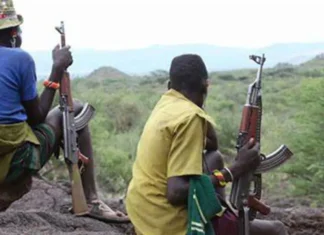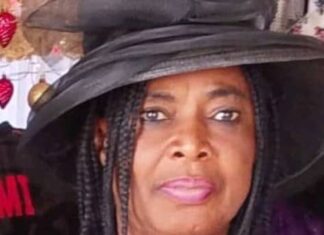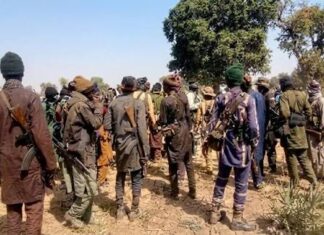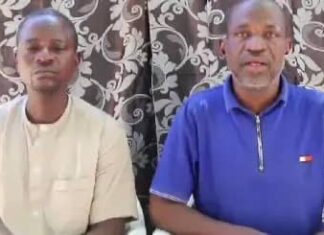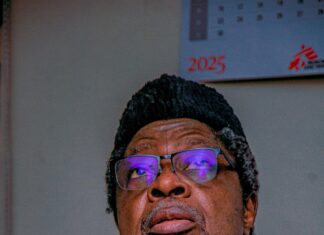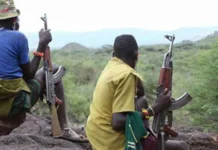By Ibrahim Sawab and Matthew Haag
(Edited)
In a two-room concrete house on the outskirts of this city along the airport road, Abdulrahman Adam’s 21-month-old body trembled as he struggled to keep down what little food he had in him. At first, his grandmother, Hauwa Saleh, sitting by his side on the dusty floor, thought Abdulrahman was teething.
But everything he ate came right back up. It continued for days in September and he added a cough and started to have diarrhea.
By then, the signs were clear: It was not a simple illness. In this northeastern part of Nigeria ravaged by the terrorist group Boko Haram, where there is not enough food to go around and no one goes to bed full, Abdulrahman was withering away from malnutrition. Nearly everyone in his neighborhood, crumbling under the influx of refugees fleeing the Islamist rebels, is skin and bones, starving and slowly dying.
Nearby in the house, his 22-year-old mother, Iyatu Adam, seven months pregnant and weak, slipped in and out of consciousness, and could not help. She had not eaten enough, either. The boy’s father had left the capital of Borno State to find a job as a day laborer because there were few jobs in the city. His uncles worked all day laying bricks to earn $1 each.
With no one else able to help, Abdulrahman’s survival depended on his 55-year-old grandmother.
Over the next 40 days, she took him to one public hospital and then another. Both denied him. There were no vacant hospital beds, they told her. An uncle spent $35 — nearly a month’s pay — to pay for his admission to a private hospital for a few days. He received fluids and medication and was released.
Back home, his grandmother continued to care for Abdulrahman. They shared the only mattress in the house with the other young siblings. Everyone else slept on the ground, a thin mat between them and the hard floor. The backyard was strewn with trash, a hole dug in the ground for a toilet.
Ms. Saleh walked 600 feet to retrieve the family’s drinking water from a well and took home what she could carry in small containers. Abdulrahman ate what grains the family could afford, or what was left over after they paid their rent with their harvest of groundnuts and beans, or what scraps their neighbors gave them. But the family was careful not to eat too much for dinner. They had to save something for breakfast.

By early November, Abdulrahman’s health had rapidly declined. He was always tired and had a fever, no appetite and a stiff neck — a sign of deadly meningitis. His mother, who was near full term, was no better.
His grandmother rushed her grandson and her daughter again to a public hospital, Umaru Shehu Ultra Modern Hospital, praying that this time it had enough room for them. A part of the hospital with 24 beds that had opened only weeks earlier, and was operated by the relief organization International Rescue Committee, accepted them on Nov. 4.
Abdulrahman was placed in a bed enclosed in a mosquito net, with other malnourished children nearby. About 200 children die every day in this area of Nigeria, the international group Save the Children reported in November.
“Our true way of being was always associated with extreme hunger,” said Ms. Saleh, sitting on the concrete stoop at the house. She has been the head of the household since her husband died seven years ago. “Ever since, my struggle to provide the family began, because I was left with no option other than to work hard and see the children grow,” she said.
At the hospital, the boy’s mother was taken to a separate area and received intravenous fluids and medication. Her health improved, and Ms. Adam gave birth to a girl, who was named after her grandmother.
But Abdulrahman’s health deteriorated. He died on Nov. 15, another victim in a region plundered by Boko Haram rebels, who have destroyed houses and schools, kidnapped thousands of young women and forced millions to flee their homes, plunging Nigeria into the worst recession in decades.
During its years long insurgency, Boko Haram stripped the area’s farmland dry, stealing crops in the country’s most fertile region to feed its fighters. Farmers fled, and many have not returned. The rebels have warned that they left behind mines on the fields.
“We only need food, food, food, and nothing else,” Ms. Adam said in an interview in December. “Hunger nearly killed me.”
By December, the International Rescue Committee’s center in the hospital had treated 210 children with severe acute malnutrition. Twenty-six had died. In the first 11 months of 2016, Borno State had nearly 75,000 extremely malnourished children. The World Food Program has declared that the region, where millions lack sufficient food, is experiencing “faminelike conditions.”
“The need for stabilizing children with severe acute malnutrition with medical complications is high,” said Mohamed Kassim, the operations manager of the International Rescue Committee’s medical center in the city. The center is working this year to treat up to 60 malnourished children a month, an increase from 50 a month in 2016, he said.
Founded in 1933 and based in New York City, the International Rescue Committee is the newest beneficiary organization supported by The New York Times Neediest Cases Fund. Of the eight groups assisted by the fund, it is the only one that works beyond the New York region. In 2015, the organization helped over 23 million people affected by conflict and disaster in more than 40 countries and 26 cities in the United States, with a focus on health, education and economic well-being.
In addition to its health center in the city, the core of humanitarian and military support in Borno, the International Rescue Committee provides food and hygiene supplies to residents, and offers services for gender-based violence and therapy sessions.
“This crisis is sorely underfunded and has largely been ignored by the international community, despite the extreme violence and clear evidence of crisis levels of food insecurity,” said Stephanie Puccetti, the organization’s senior emergency program coordinator in Nigeria.
In the two months since Abdulrahman died, Ms. Saleh and her daughter have returned home to lives still filled with uncertainty and peril. Ms. Saleh, who earned $10 a month as a housekeeper for a family, has not worked since that family left town.
The all-day job was grueling and the pay was only enough to cover the cost of the bus fare there and back, so she had started to walk the approximately six miles round trip to save some money. But it paid in other ways: The family gave her leftovers to take home.
Her sons, after a day’s work of laying bricks, pool their $2 to buy food to bring home. Ms. Adam is eating more often, but not the nutritious food she needs while she nurses her newborn daughter, Ms. Saleh said. A few weeks ago, Ms. Adam’s husband sent $15 to her that he had made working in another city. It paid for food.
“We have been praying that may God grant that we get out of this situation soon,” Ms. Saleh said. “And for now, it’s only prayer, prayer and prayer.”
Culled from The New York Times
Sawab reported from Maiduguri, and Haag from New York.
Follow the Neptune Prime channel on WhatsApp:
Do you have breaking news, interview request, opinion, suggestion, or want your event covered? Email us at neptuneprime2233@gmail.com


